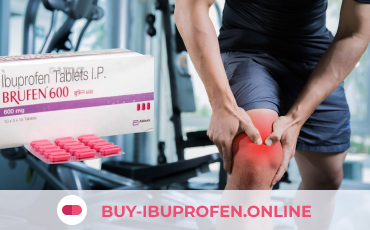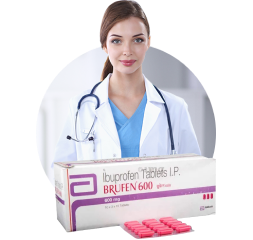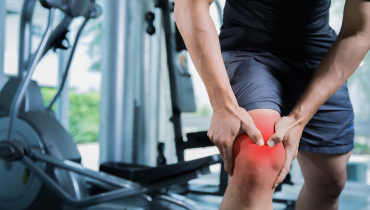Is it true that anti-inflammatory drugs reduce the effectiveness of exercise?
If you feel pain before or after a workout, taking a couple of ibuprofen tablets is quite typical. In just 20 minutes, the drug works wonders: the pain is reduced, and you can continue exercising or other activities without experiencing problems. But as time goes by, you may notice that the slightest thing happens and you reach for the next pill. To relieve muscle pain or to relieve joint and tendon pain – it doesn’t matter. After all, it’s more comfortable for you to do sports, and you recover much faster.
It turns out that there are several studies that say that taking ibuprofen and other non-steroidal anti-inflammatory drugs can harm your precious athletic performance. After all, the drugs prevent post-workout muscle inflammation, which actually makes you get bigger and stronger.
Here’s a breakdown of whether or not you need to give up ibuprofen and put up with the pain, lest you negate all the effort you put into your workouts.

What are NSAIDs and how do they relieve pain?
Ibuprofen is a type of non-steroidal anti-inflammatory drug, NSAIDs for short. NSAIDs are a widely used group of medications that reduce pain, inflammation, and relieve fever. Of this group, ibuprofen is the most common guest in every athlete’s medicine cabinet.
Aspirin and naproxen are other representatives of anti-inflammatory drugs. Among NSAIDs for topical use, the most common is Diclofenac or Voltaren.
NSAIDs block the body’s production of chemicals associated with pain and inflammation, specifically cyclooxygenase (COX) enzymes. COX, in turn, are divided into two types: COX-1 and COX-2. Most NSAIDs block both forms of cyclooxygenases. Such drugs are called non-selective. These include the familiar aspirin, ibuprofen and naproxen.
Some anti-inflammatory drugs block only COX-2 and are called selective NSAIDs. For example, celbrex. Selective drugs usually require a doctor’s prescription. This article focuses on non-selective NSAIDs, which are available without a prescription and are in everyone’s medicine cabinet.
Do anti-inflammatory drugs harm athletic performance?
So, we know how NSAIDs relieve pain: they block two enzymes that are produced during inflammation. But if inflammation stimulates muscle growth and NSAIDs suppress inflammation, could taking a few ibuprofen pills before a workout impair athletic performance?
If you’re in a hurry, our answer is “probably not.” If you want to know more, read on.
As we said, there are several studies showing that NSAIDs (especially ibuprofen) can interfere with the training adaptation that allows you to lift more weights and run faster. The hypothesis is that by reducing the inflammation needed to repair damaged muscles after a workout, you prevent your muscles to adapt and get bigger and stronger.
A 2002 study is often cited to support this hypothesis. Researchers found that people who took ibuprofen after a workout had reduced protein synthesis, the process muscles use to turn proteins into new muscle tissue. And studies done on mice showed similar results.
Many athletes rely on this research to persuade themselves not to use ibuprofen, even if they are in severe pain. They fear that the drug will harm their form and strength.
However, an experiment conducted in 2011 by the author of a previous study showed that taking ibuprofen did not suppress muscle protein synthesis. Subsequent work has shown the same thing: ibuprofen has virtually no effect on muscle growth.
So what’s the bottom line? If inflammation is necessary to repair damaged muscles after a workout, how can taking anti-inflammatory drugs NOT interfere with that process?
Well, if inflammation depended only on COX enzymes, then NSAIDs would indeed interfere with muscle adaptation. But in fact, inflammation is quite a complex process (like most physiological processes) and involves several different chemicals and enzymes. Even if you take ibuprofen before or after a workout, you will still have a small inflammatory reaction that will lead to muscle growth.
Bottom line: taking NSAIDs before or after a workout probably won’t have a negative effect on your muscle growth and strength performance. By contrast, taking ibuprofen before a workout will likely help improve your performance. After all, without feeling pain, you will run faster or lift weights more easily. In other words, ibuprofen will allow you to train – to continue exercising even if you are experiencing minor pain.

How to use anti-inflammatories to relieve pain during exercise
So, if NSAIDs don’t worsen athletic performance, then are you safe to take them? Not so fast.
After all, NSAIDs are drugs. And where there are medications, there are side effects. Especially if you take them in large quantities over a long period of time.
The most common consequence of taking large amounts of ibuprofen or naproxen for a long time is stomach bleeding. Other potential side effects are kidney failure and high blood pressure.
For long-term treatment of pain, take more serious measures
Taking your maximum daily dose of NSAIDs for several days should not cause potentially dangerous side effects. If you are still experiencing pain that interferes with your workout a few days after starting NSAIDs, take a step back and figure out what is causing the pain. Maybe the uniform you use during weightlifting or running is no longer appropriate and needs to be replaced.
Maybe some part of your body is hurting due to overexertion and you just need to change the type of exercise to allow the inflamed muscle/tendon to heal and recover. For example, if you do strength training and are experiencing pain in your conductive muscles, do barbell squats instead of low barbell squats until the pain goes away.
And if you have shoulder tendonitis, replace the barbell press with a dumbbell press that won’t cause discomfort. If you’re a runner, changing your workouts might mean alternating days of running and strength training (this way you not only allow your muscles to rest, but also strengthen them and reduce the chance of future injuries), changing the type of terrain you run on (for example, day on the sidewalk, day on the trail, day on the treadmill) and even your shoes (use at least two different pairs and alternate them).
In general, the main remedy for long-term pain relief is to find alternative movements or programs that allow you to train without pain, so you can recover and return to your normal workout routine.
If you are still experiencing pain that is uncomfortable after making changes to your workouts, try applying Voltaren gel to the painful area. It reduces pain, mild to moderate, in people with arthritis, but can be used for other conditions as well. Because the gel is applied topically rather than orally like ibuprofen, it has a much lower absorption rate and can be used for a long time with minimal side effects.
What’s the bottom line? Don’t be afraid to take anti-inflammatory medications to relieve exercise-related pain for a few days. Just follow the instructions on the package and don’t exceed the maximum daily dose. If you are still experiencing pain after a few days of taking them, determine the root cause. To do this, see a specialist.
They may require you to change your exercise program. Then leave the exercises that do not cause pain, but allow you to work out. If the pain does not go away, try a topical NSAID such as Voltaren.












I received the package a few days ago. Thank you so very much! Everything was perfect. I do appreciate your great service and will most definitely order again from you. I'm glad to say that I can recommend you with total confidence. Thanks
Yeah! The package arrived very quickly. Thanks!
Everything is fine! Thanks!